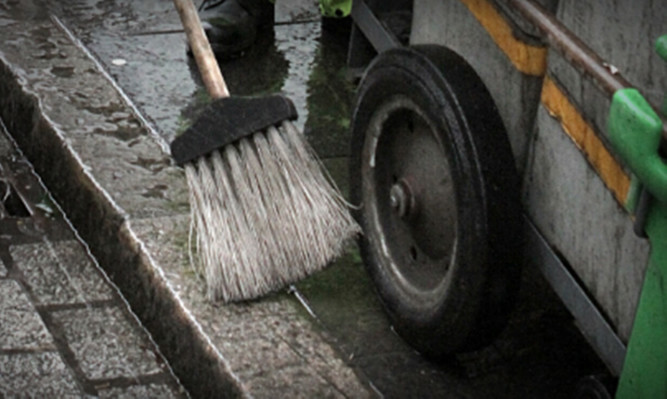Around 60 street sweepers are likely to be made redundant across Fife, prompting fears of rubbish-strewn roads.
The news, branded a “backward step” by an opposition councillor, has come as a bitter blow to an already under pressure staff.
Although there has been no official confirmation from the council, unions have warned members could be balloted for strike action if there was a single compulsory redundancy.
Debbie Thompson, joint trade union secretary, said: “To take that level of staffing resource from the team, I cannot see how they would be able to deliver services.”
She said there will still be the same expectation from the public who want streets free from rubbish, but it was all being done with 11% fewer council staff.
It would hit staff whose morale was already at “rock bottom. This is terrible.”
A whistleblower said he was angry it “always seems to be the low end” of council staff hit by job losses.
He revealed the recent blow was on the top of around 100 posts cut in the past two years. This had piled more pressure on the workers who instead of doing one beat were now covering two.
“Street cleaners seem to get hit all the time,” he said.
“Everyone used to get round their area and keep it clean and tidy but that changed from one to two, and now it will be three how are we going to be able to do that?”
He said clean streets was perennially in the public’s top five most important things in Fife.
“And yet they take the biggest hit, they are the easiest target,” he added.
Levenmouth councillor John O’Brien predicted more rubbish in the streets as a result.
“There will be no one there to clean up,” he claimed.
“People pay their council tax and deserve a better service, not a worse one.”
Fife Council leader David Ross confirmed further savings to the parks, streets and open spaces budget were agreed last month.
Officers were now developing plans to deliver savings, so it was too early to estimate how many workers would be affected.
“We realise the impact that making these difficult savings has on our employees and will, of course, fully consult with staff and the trade unions as these plans progress,” he said.
The council had cut its workforce by 11% since 2010 and now has around 300 fewer managers.
“A range of savings have and continue to be made by departments across the whole of the council but our financial challenge is well documented with £30.9m of savings that have to be found in 2016/17 alone.
“Protecting vital frontline services is a priority and it’s hoped that, where possible, we can make these particular savings on a voluntary basis.”
